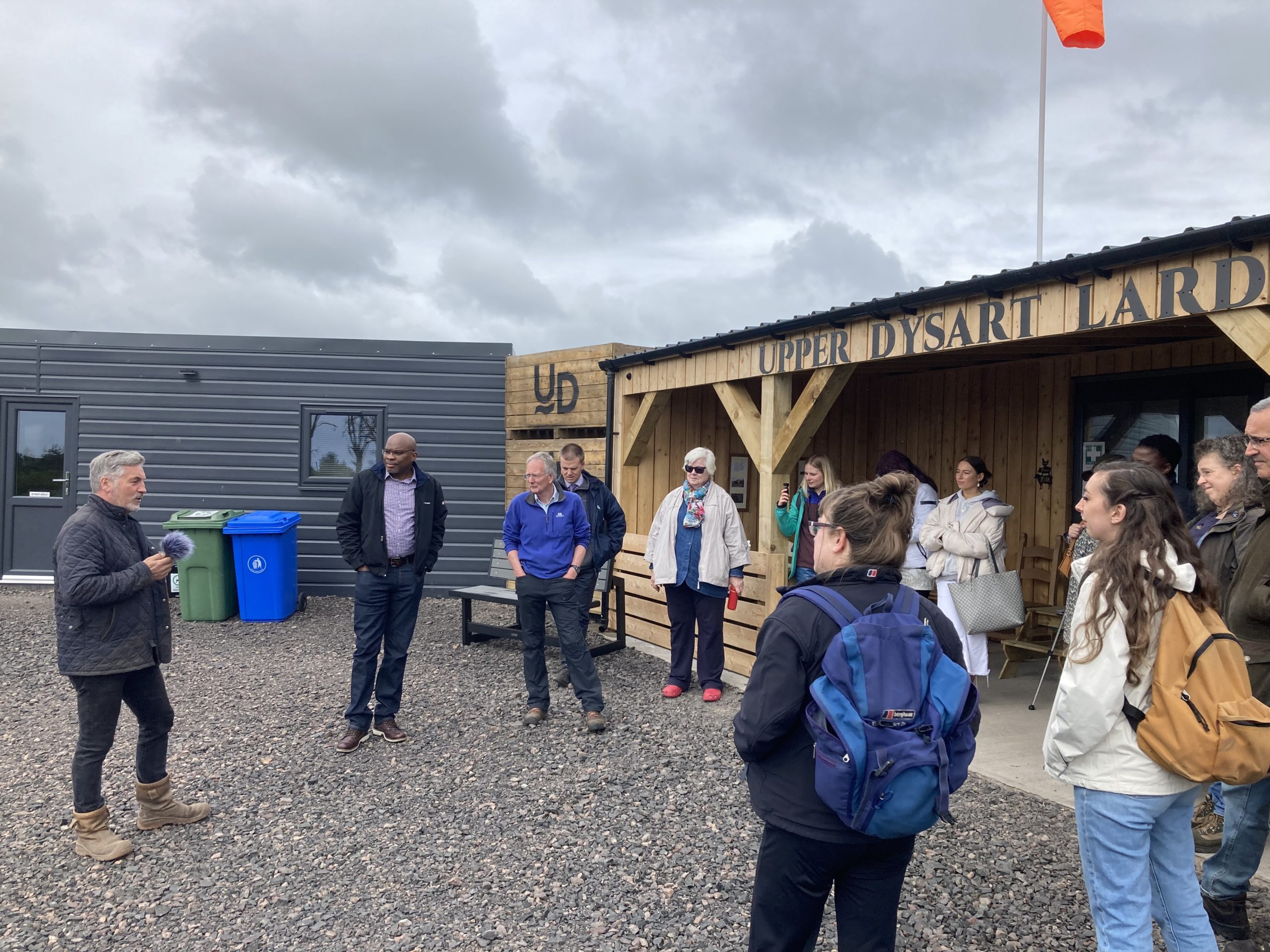The first Tayside Bioregioning Learning Journey gave a taste of what rural Tayside could look like if ecology was put at the heart of producing food, the local economy, education and societal wellbeing.
What will be on our plate in 2042? – which drew interest from a mix of stakeholders including young people, growers, scientists, the National Farmers Union and Scottish Government – visited four different food producers.
It looked at the challenges and opportunities of growing commercially for retailers and food innovation at Upper Dysart Farm near Montrose to nature-positive farming at Kirklandbank Farm near Alyth, small-scale organics at Myreside near Meigle, and developing a new community garden, Campy Growers, and energy-efficient building at Camperdown Park.
A bioregion is a landscape defined not by political or economic but natural borders, and the aim of the Tayside Bioregioning initiative, co-initiated by Clare Cooper in 2019, is to reframe thinking and grow greater understanding of the impact of land management on every aspect of life. She explains:
“A healthy ecosystem facilitates our survival, and we need dynamic widespread behaviour change to move towards more regenerative, resilient lifestyles. We currently have a broken economic model which is fuelling the climate crisis, threatening the food webs we depend on and impacting society and mental health.
“This learning journey brought together people from across Tayside to see how we can reframe our thinking and reorientate human activity in our locality to mitigate this decline. We want to introduce long-term strategies to address the twin concerns of climate and land-use change, and part of this is giving greater agency to the local community on issues that impact them most. This includes access to affordable, nutritional food, flood mitigation, fulfilling education or attracting regenerative tourism that leaves the area in a better state. By changing the frame, we can change the story.”
The discussion during the day demonstrated how the local area could thrive and strengthen – economically and socially – by restoring natural landscapes and collaborating across urban and rural, and between sectors, to co-create solutions to climate change and sustainable livelihoods. Working on a bioregional level allows the group to harness indigenous, place-based knowledge from participants and the assets of the natural topography to benefit the cross-section of stakeholders.
Martha Smart, Tayside Climate Hub Co-Ordinator, who attended the day, said:
“Seeing a broad range of businesses was an opportunity for us all to better understand the context we are working in, and prompt important discussion around systems where the pressures of producing ever more food and farm subsidies have created intensive practices needed for farming businesses to survive. This has come at the cost of our environment and nature and plays a role in food waste and flooding. The day’s discussion was brilliant for framing it differently, looking at relocalisation rather than growth at any cost, and how the regeneration of local ecological systems can build community resilience and actively respond to global heating.”
Three further key areas that Bioregioning Tayside is working on, subject to funding, are how communities can help monitor landscape changes, a biodiversity and carbon collective and how Regenerative Tourism can grow in Scotland. This is a step beyond sustainable tourism, by which visitors help leave places in a better state than when they arrived through being mindful about the carbon footprint of their travel, their impact on host communities and the natural environment and volunteering on ecological or social projects. The new outdoor Cateran Eco-Museum is already pioneering this approach.
The idea behind a carbon collective is to democratise carbon capture and allow smaller landowners and farmers to sell at scale as carbon trading accelerates. The collective would also contribute a percentage of sales in community benefit payments, similar to community wind farms.
This was the first in a series of learning journeys to explore how some of the big issues can be addressed through reframing and collaboration. The next Bioregioning Tayside learning journeys, open to all interested parties, are:
Bioregioning Tayside Learning Journeys
Change the frame, change the story
• Can Tourism Help Tayside #RaceToZero
Date: 30th June 2022m online 4-5pm
• What Will I Do When The Waters Rise?
Date: 2nd July 2022 Alyth 12.00-4.00pm
• How can participatory science bring new solutions to ecosystem restoration?
Date: 14th July 2022, online 4-5pm
For more information on Bioregioning Tayside or to register for these events see www.bioregioningtayside.scot

